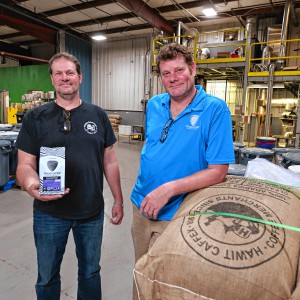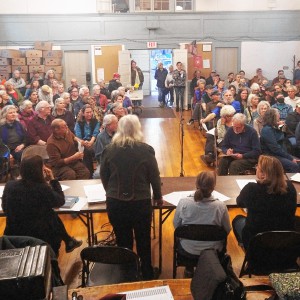Peaches pummeled: Area farmers report massive peach losses reminiscent of 2016
| Published: 04-10-2023 11:11 AM |
The 2023 season isn’t looking too peachy for New England farmers waiting to see if any of their buds survived mid-February’s subzero temperatures.
It appears that month’s cold snap crippled the growth of the beloved stone fruit typically harvested from mid-July to September, and those who make their living in agriculture are crossing their fingers that any amount has been spared.
“We assume we don’t have too much of a peach crop this year, but we’re just sort of waiting till bloom to see if some of the heartier varieties might have a crop on them. But we’re just sort of waiting for the moment and hoping for the best,” said Tim Smith, owner of Apex Orchards in Shelburne. “Peaches should bloom in, like, three weeks, something like that. And then we’ll have a real good handle on what’s going to be there.”
Smith said the culprit was one night in February when the temperature dropped to 14 degrees below zero. He explained peaches start suffering damage at 10 degrees below zero and are a total loss at 20 below.
“We assume we have some damage, how much we really don’t know yet,” Smith said. “We’re still hopeful there’s something, but we’ll see.”
He said his farm grows about 30 varieties of peaches and nectarines, which he believes suffered the same fate as the peaches.
Area farmers say this year is reminiscent of the “St. Valentine’s Day massacre of 2016,” when peach crops were decimated after temperatures approached an unseasonable 60 degrees leading up to Feb. 14, before dropping to 20 below zero overnight. Farms in this area lost tens of thousands of dollars worth of peaches, though the crop was abundant the following year.
Ben Clark, owner of Clarkdale Fruit Farms in Deerfield, said the temperature at the property dipped to 13 degrees below zero for at least six hours in mid-February.
Article continues after...
Yesterday's Most Read Articles
 1989 homicide victim found in Warwick ID’d through genetic testing, but some mysteries remain
1989 homicide victim found in Warwick ID’d through genetic testing, but some mysteries remain
 Fogbuster Coffee Works, formerly Pierce Brothers, celebrating 30 years in business
Fogbuster Coffee Works, formerly Pierce Brothers, celebrating 30 years in business
 Greenfield homicide victim to be memorialized in Pittsfield
Greenfield homicide victim to be memorialized in Pittsfield
 Real Estate Transactions: May 3, 2024
Real Estate Transactions: May 3, 2024
 Battery storage bylaw passes in Wendell
Battery storage bylaw passes in Wendell
 As I See It: Between Israel and Palestine: Which side should we be on, and why?
As I See It: Between Israel and Palestine: Which side should we be on, and why?
“The same as seven years ago, exact same,” he said.
Clark said peach trees make up 10 of his farm’s 45 acres, with apples and pears being the other best-sellers. Fortunately, he said, those latter two fruits can withstand temperatures as low as 25 below zero. He is hopeful some tart cherries and plums may have survived, but he’s not holding his breath.
“This is climate change, unfortunately,” he said. “Climate change is very real. Ask any farmer, or at least most farmers.”
Because they are best eaten fresh, Clark said, the loss of peaches is a bit of a double whammy, as customers stopping by to purchase baskets of the stone fruits often pick up other items during their visit. This was echoed by Chip Hager, one of the owners of Hager’s Farm Market in Shelburne.
“It’s one thing to lose the peaches, but it’s another thing to lose the people [coming] through the door,” he said.
Hager said an orchard equipment salesperson recently told him this problem is affecting all of New England, as well as New York and Pennsylvania. He said Hager’s will have to focus on selling vegetables and baked goods.
“I spent quite a bit of time looking for [peach] buds and I haven’t seen a live one yet,” he said.
David Pease, owner of Pease Orchard in Templeton, said 20-30 mph winds in February worsened the cold injury his peaches sustained.
“You could say the jury’s still out, but I don’t know, it doesn’t look good from what we’ve examined,” he said. “It’s a tremendous cash crop for us farmers. It’s going to be a big hit for the Pease Orchard.”
Like the other farmers interviewed by the Greenfield Recorder, Pease said he carries crop insurance, but it won’t be enough to cover the losses.
“It’s like putting a couple lug nuts on your car after you’re car’s been totaled,” he explained.
Pease said his orchard typically carries about 10 varieties of peaches and last year was solid. Still, farming can feel similar to gambling, he said.
“There are some people that go to Mohegan Sun or Atlantic City or Las Vegas — some of us go into farming and … roll the dice. We’re at the mercy of what Mother Nature hands us and we have to try to bob and weave ... around it,” Pease said. “It just seems like every [few] years something comes in and knocks you off your bicycle.”
Reach Domenic Poli at: dpoli@recorder.com or
413-930-4120.

 Bridge of Flowers in Shelburne Falls to open on plant sale day, May 11
Bridge of Flowers in Shelburne Falls to open on plant sale day, May 11 Community Legal Aid expands Disability Benefits Project to Franklin County
Community Legal Aid expands Disability Benefits Project to Franklin County Wear Orange organizers prepare display to remember gun violence victims
Wear Orange organizers prepare display to remember gun violence victims Deerfield candidates, Whately incumbent discuss issues with voters at South County Senior Center
Deerfield candidates, Whately incumbent discuss issues with voters at South County Senior Center
